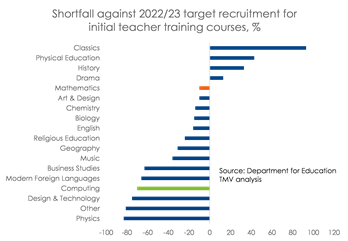News
Rishi Sunak gave a speech on Wednesday hinting at plans to ensure all school pupils in England study maths in some form until the age of 18. Few could disagree that a more numerate workforce would be beneficial. But the speech has triggered a debate on what maths teaching is needed and how any change to the status quo could be achieved.
For the purposes of full disclosure – I am a maths geek. It was my favourite subject in school and I did a maths undergraduate degree. Now I am thrilled when I have a chance to help my kids with their maths homework!
But I don’t believe that forcing children to learn a subject is the way to encourage enthusiasm for it. Quite the reverse in fact. In my experience, forcing teenagers to do anything tends to have exactly the opposite effect to that which was intended.
 By all means we should consider how we teach maths with the aim of encouraging more kids to want to continue it to age 18. This is a question not so much of syllabus content but more about teaching methods, engagement and use of and access to technology to facilitate different learning styles.
By all means we should consider how we teach maths with the aim of encouraging more kids to want to continue it to age 18. This is a question not so much of syllabus content but more about teaching methods, engagement and use of and access to technology to facilitate different learning styles.
But advanced calculus and geometry skills rarely pay the bills in adult life. Numeracy and digital skills on the other hand are essential. Surely what Sunak should be focused on is how schools can offer everyone lessons on things like personal finance, household budgets, core computing skills, coding….
However, to achieve more teaching of any numerate discipline, the government needs first to address the desperate shortage of teachers. It fell 10% short of its 2022 target level of recruitment to initial teacher training courses for maths. The equivalent shortfall for computing teachers was a woeful 70%.
Whatever the answer on making all kids learn maths, the challenge of reimagining the country’s approach to numeracy must start with teacher recruitment.
Posted by Tania Wilson at '10:14'
- Tagged:
skills
« Back to previous page